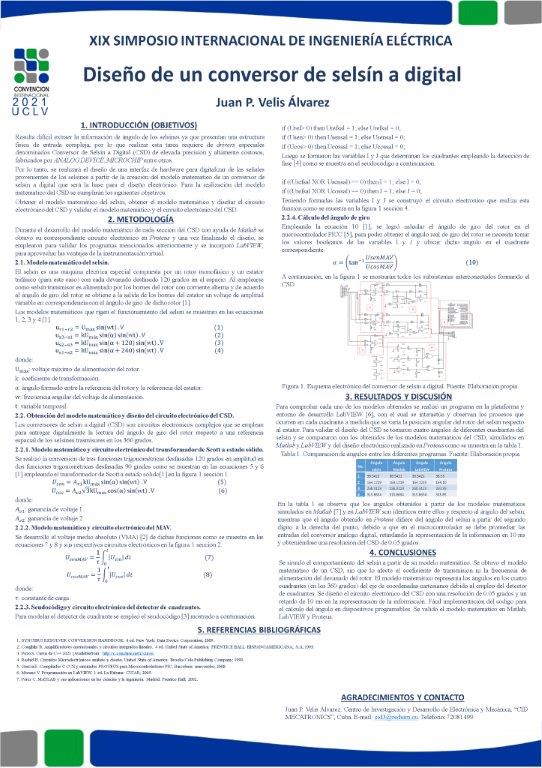Executive Secretary

19th International Symposium of Electrical Engineering
SIE 2021

Abstract
The industry uses complex electrical machines such as synchros. This transducer is used in synchronous tracking systems as angular position transmitters and receivers. Replacing these electrical machines with other elements is sometimes not feasible because it involves invasive mechanical-constructive modifications, due to the high complexity of integration to the systems in which they are coupled, in addition to having high resolutions, high robustness to electrical interferences and phenomena mechanical. Therefore, it is proposed to design a synchro to digital converter as a hardware interface to digitize and process the signals from synchro through a mathematical model and obtain the angular position of the transducer. The objectives are obtaining the mathematical model of synchro, mathematical model of the synchro to digital converter, development of the hardware interface and validation of the system. During the development of the work, computer programs such as Matlab, LabVIEW and Proteus are used for design and simulation. The mathematical model of a synchro to digital converter with a resolution of 0.0219 degrees was obtained for a 12-bit converter with indication of the angle in the four quadrants of the Cartesian coordinate axis and there are no variations in the result of the angular position before rotor voltage variations. A hardware interface was achieved to digitize and process the signals from the synchro through a mathematical model and obtain the angular position of the transducer.
Resumen
La industria, emplea máquinas eléctricas complejas como los selsines. Este transductor es empleado en los sistemas de seguimiento sincrónico como transmisores y receptores de posición angular. Sustituir estas máquinas eléctricas por otros elementos en ocasiones no es factible porque conlleva modificaciones mecánico-constructivas invasivas, debido a la alta complejidad de integración a los sistemas en que se encuentran acopladas, además de que presentan altas resoluciones, alta robustez ante interferencias eléctricas y fenómenos mecánicos. Por lo que se propone diseñar un conversor de selsín a digital como interfaz de hardware para digitalizar y procesar a través de un modelo matemático las señales provenientes del selsín y obtener la posición angular del transductor. Los objetivos son, obtención del modelo matemático del selsín, modelo matemático del conversor de selsín a digital, desarrollo de la interfaz de hardware y validación del sistema. Durante el desarrollo del trabajo se hace empleo de programas computacionales como Matlab, LabVIEW y Proteus para el diseño y simulación. Se obtuvo el modelo matemático de un conversor de selsín a digital con una resolución de 0.0219 grados para un conversor de 12 bits con indicación de ángulo en los cuatro cuadrantes del eje de coordenadas cartesiano y no se presentan variaciones en el resultado de la posición angular ante variaciones de la tensión del rotor. Se logró una interfaz de hardware para digitalizar y procesar a través de un modelo matemático las señales provenientes del selsín y obtener la posición angular del transductor.
About The Speaker

Juan Pablo Velis Álvarez










